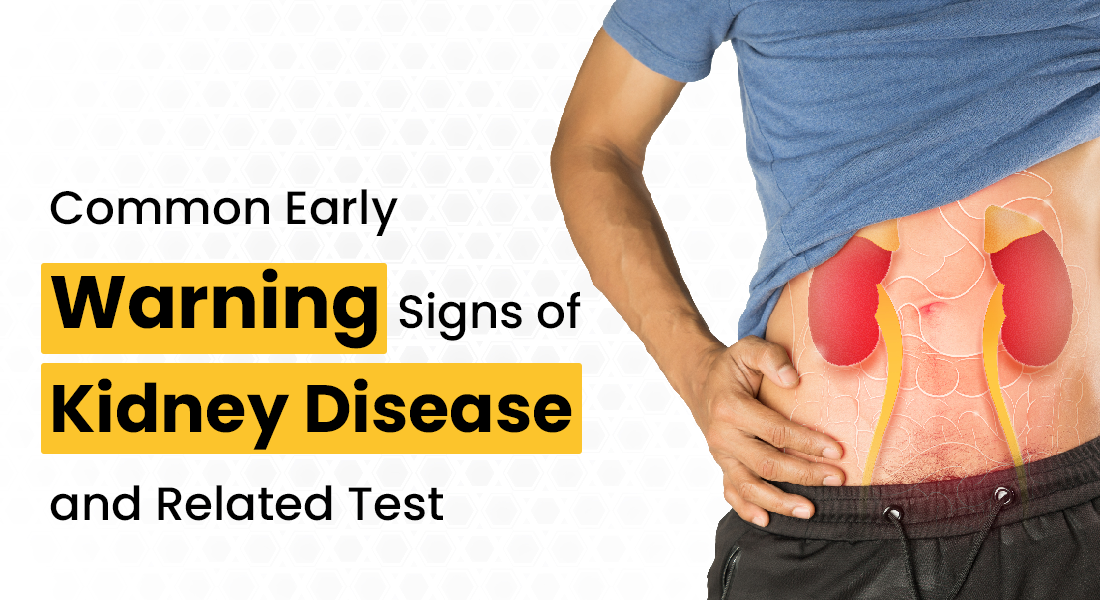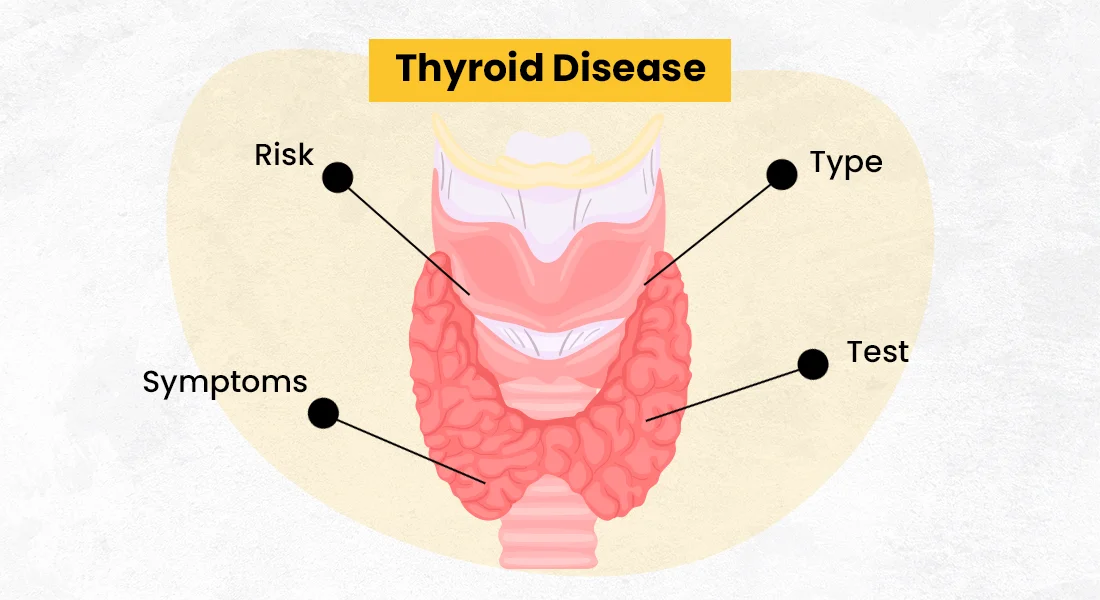Common Kidney Disease Type, Symptoms, Causes, and Tests

On this page
The ability of your body to filter excess water from your blood, purify it, and assist in blood pressure regulation can all be impacted by many types of kidney disease. Additionally, it might have an impact on the synthesis of red blood cells and the metabolism of vitamin D, both of which are essential for healthy bones.
Your body may accumulate waste products and fluid if your kidneys are damaged. It may result in weakening, nausea, oedema in your ankles, restless nights, and dyspnea. If you don't get treatment, the signs of kidney disease might worsen, and your kidneys might finally stop functioning. That may threaten one's life, so take it seriously.
Understanding Kidney Disease
The kidneys are vital organs that filter waste and excess fluids from the blood to be excreted as urine. Kidney disease is when the kidneys are damaged and cannot filter blood effectively. It leads to a dangerous buildup of fluids and waste in the body. Understanding the basics of kidney disease and timely diagnosis with the help of kidney function test can safeguard this critical organ system.
Types of Kidney Disease
There are several major types of kidney disease and causes:
Chronic Kidney Disease (CKD) -
- Degeneration of the kidneys gradually over months or years
- Main causes are high blood pressure and diabetes, damaging blood vessel
- Can lead to complete kidney failure requiring dialysis/transplant
Kidney Stones -
- Hard crystal deposits forming in the kidneys
- Can cause severe pain passing through the urinary tract
- Infections, genetics, and diet influence stone formation
Urinary Tract Infections -
- Bacterial infections in the bladder, ureters or kidneys
- Can permanently damage kidneys if untreated
- More common in women and treated with antibiotics
Polycystic Kidney Disease -
- Genetic disorder causing fluid-filled cysts in kidneys
- Cysts impair kidney function and eventually cause failure
- No cure exists, but treatment manages symptoms
Glomerulonephritis -
- Inflammation of glomeruli, which filter blood in kidneys
- Often caused by infections and systemic diseases
- Impairs the kidney's ability to filter blood properly
Signs and Symptoms
Since kidney disease progresses gradually, detectable symptoms generally manifest in advanced stages. However, the following signs of kidney disease can indicate kidney problems at any stage:
- Fatigue, inability to concentrate, poor sleep
- Swollen legs, hands, puffy eyes
- Frequent or infrequent urination
- Nausea, vomiting, loss of appetite
- High blood pressure resisting medication
- Foamy, bloody or dark urine
- Flank pain while urinating
Catching symptoms early allows treatment for kidney disease before extensive damage occurs. People with risk factors like diabetes and hypertension should get regular screenings.
Diagnosis and Tests
Prior to starting any treatment, your doctor will review your medical history, perform a physical examination, inquire about any current prescriptions you are taking, and ask about any kidney disease symptoms you have experienced. Your healthcare provider will prescribe blood and urine tests to assess kidney function.
Blood tests:
- Kidney Function Test (KFT):- Kidney function tests include blood tests that measure how efficiently your kidneys work. The kidneys play a vital role in removing waste, toxins, and extra water from the body.
- Serum Urea (S. Urea):- The urea test is a blood test that is used to know the level of urea in blood. The amount of urea in your blood indicates how efficiently your kidneys function. It is used to diagnose other conditions, such as liver disease, dehydration, and heart failure.
- Blood Urea Nitrogen (BUN):- Blood urea nitrogen is a blood test, that reveals important information about how well your kidneys are working. It measures the total amount of urea nitrogen that's in your blood.
- Estimated GFR:- The glomerular filtration rate (GFR). This indicates the number of millilitres per minute your kidneys filter blood, which indicates how well they work. You can use your GFR to find out what stage your kidney disease is at.
- Serum Creatinine:- Your serum creatinine level indicates your kidneys' ability to eliminate this waste product. If your blood creatinine level is high, it indicates that your kidneys aren't working efficiently enough to eliminate it from your urine.
Urine Test
- Urine R/E:- A urine test for kidney disease will search for blood and albumin, a protein, in your urine. Nor should healthy kidneys contain either.
Imaging Studies
Additional a kidney function test could include imaging studies like computed tomography (CT), magnetic resonance imaging (MRI), and/or ultrasound to check for issues with the size and structure of your kidneys.
- USG Kub
- MRI Upper ABD
- CT Upper ABD
Treatment Approaches for Kidney Disease
Certain forms of kidney disease are treatable, depending on the underlying kidney disease causes. However, chronic kidney disease is often incurable. Typically, treatment entails taking steps to lessen complications, manage symptoms, and slow the disease's progression. You may require end-stage kidney disease treatment if your kidneys sustain significant damage.
Treating Complications:
You can manage the complications of kidney disease to improve your comfort level. Possible treatments include:
- Medications for high blood pressure. Renal disease patients may experience an increase in their high blood pressure. Your doctor may prescribe drugs to maintain renal function and lower blood pressure, most commonly angiotensin-converting enzyme (ACE) inhibitors or angiotensin II receptor blockers.
- Medications to reduce swelling. Fluid retention is common in people with chronic renal disease. Both elevated blood pressure and leg swelling may result from this. Diuretics are medications that help keep your body's fluid balance in check.
- Anaemia-treatment medications. Erythropoietin (pronounced "uh-rith-roe-POI-uh-tin") supplements, sometimes combined with extra iron, aid in the production of red blood cells. This may alleviate anaemia-related weakness and fatigue.
- Medications that protect your bones. Supplements containing calcium and vitamin D can help prevent weak bones and reduce your risk of fracture. To reduce blood phosphate levels and shield your blood vessels from calcium deposits that could cause damage, you may also take phosphate binder medication (calcification).
In order to monitor the progression or stability of your kidney disease, your doctor may advise routine follow-up tests for kidney disease.
Treatment For Advanced Kidney Disease:
End-stage kidney disease occurs when the kidneys are unable to eliminate waste and fluid on their own, leading to either total or nearly total kidney failure. You then require a kidney transplant or dialysis.
- Dialysis. When your kidneys are unable to eliminate waste materials and excess fluid from your blood, dialysis artificially performs this function. Hemodialysis involves the removal of surplus and waste fluid from your blood via a machine.
- Kidney transplant. Surgically implanting a donor kidney into your body is the process of a kidney transplant. Living people can donate kidneys for transplantation, as can deceased people.
You will be required to take lifelong medication following a transplant in order to prevent organ rejection. A third option is to treat your kidney failure conservatively if you decide against dialysis or a kidney transplant. Symptom management, advanced care planning, and comfort care (palliative care) are likely examples of conservative measures.
In Conclusion
In this world kidney day, you must know that it is possible to treat certain kidney diseases while preventing others. Therefore, you should immediately see your doctor if you encounter any kidney disease symptoms. Your doctor will review the details and assess whether a particular illness is the cause. Your physicians will find it easier to treat your kidney illness if you receive a diagnosis sooner.
DISCLAIMER: THIS WEBSITE DOES NOT PROVIDE MEDICAL ADVICE. The information including text, graphics, images, and other material contained on this website is for informational purposes only. No material on this site is intended to be a substitute for professional medical advice, diagnosis, or treatment. Contact a health expert if you have questions about your health.













Comments List